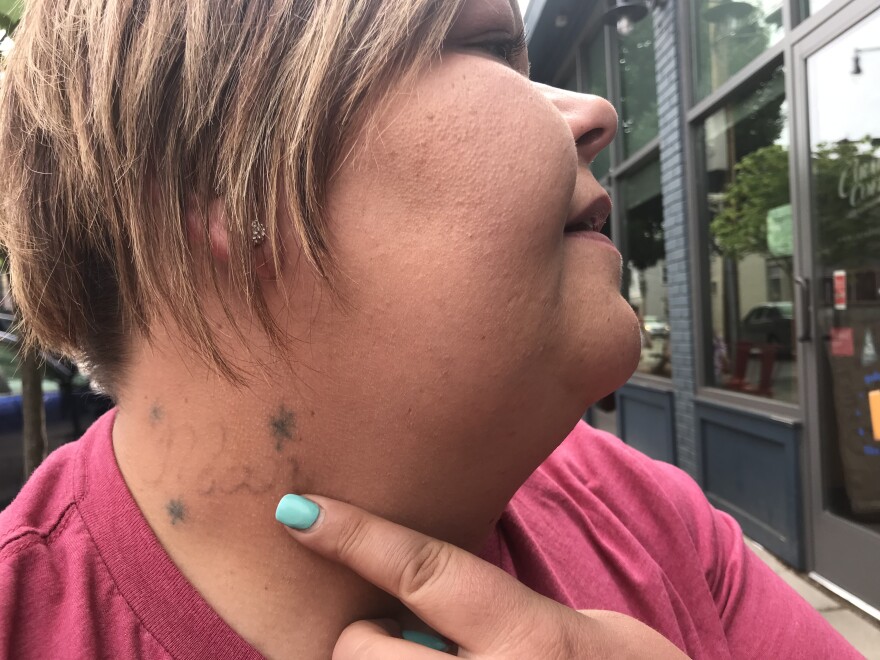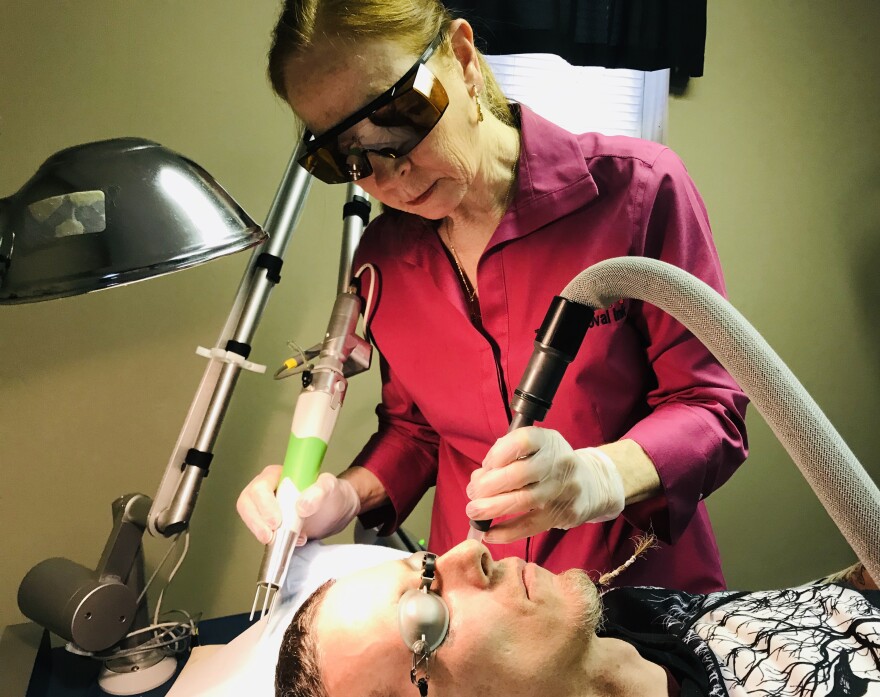Tattoos are considered a cultural norm by some people. Medically safe and visibly attractive, many people who wear them refer to the tattoos as body art.
It can be a very different story for people who get their tattoos behind bars.
It’s a sunny Friday afternoon in Northern Kentucky. Jerry Wiseman and his brother Joe are making their way up the steps into a yellow frame house on Dixie Highway. That’s where Jo Martin is 5 days a week, removing hand, neck, and face tattoos of people who’ve been incarcerated, for free. She also offers free tattoo removal for victims of human trafficking. The director of ‘Tattoo Removal Ink’, greets the brothers who are interested in getting a fresh start.

Forty-one-year -old Jerry Wiseman has spent two decades of his life in and out of jail. His body is covered in tattoos. He learned about ‘Tattoo Removal Ink’ just recently.
Wiseman said, “I went to go report to my probation officer and I seen the pamphlet and picked it up and just tired of people stereotyping me so figured to get it done. If I try to go get a job it’s almost impossible.”
Body art in the form of tattoos may seem culturally acceptable but Martin said the tattoos of prisoners are frequently offensive.
Martin said, “Most of the tattoos we are removing are symbols of hate, they’re swastikas, they’re the lightning bolts, the SS symbol, they’re teardrops. I have people that have ‘hopeless’ on their forehead.”
Martin escorts Jerry Wiseman into the treatment room where she first takes pictures of his tattoos including a five point star denoting a certain gang. She gives him a pair of eye goggles to protect his eyes. Then as he rests back on the examination table Martin uses a wand from a cryo machine which chills the skin prior to and during the treatment. Soon she moves a laser close to the corner of his eye.
She describes the process as exploding the ink at the dermis level.
Martin opened the non-profit after retiring from a 30-year corporate career. The 67-year-old was tutoring in the Kenton County Detention Center. Seeing tattoos on the faces of the inmates week after week inspired her to investigate what it would take to help inmates get those removed once out of jail. With insurance money from the death of her husband of 35 years, she was able to get started.
Martin said God led her through the process. She said she didn’t wake up one morning and say she was gonna take tattoos off of people that are coming out of incarceration.
Martin also met with Father Greg Boyle, a Roman Catholic priest in Los Angeles who founded Homeboy Industries. His 30-year operation is a gang intervention and re-entry program that provides multiple services including tattoo removal, resume writing, mental health support and, housing. Martin isn’t expecting to expand her non-profit as big as Boyle’s. But he did inspire her to move forward.
“It was so encouraging to talk to him and all the stuff he was doing out in California I thought it was so doable to do it here in Kentucky.”, Martin said.
Two doctors and three nurses are on the board of directors at ‘Tattoo Removal Ink’ where eryone is a volunteer.
Since opening three years ago, Martin has treated hundreds of people. She says she gets to know everyone’s story.
Martin said, “The worst tattoo I’ve ever seen come through is a Hannibal Lecter mask. The man has it all the way across both cheeks, across his nose. He has the bars on his lips. He put that on his face when his son committed suicide while he was in prison and he kind of wanted to be done with the world and the world done with him.”
In Kentucky, about 24,000 people are in state prison, 13,000 in local jails and 3,500 in federal prison according to Wanda Bertram, with the Prison Policy Initiative.
Bertram said, “We did a study last year that showed as of the most recent data the unemployment rate among formerly incarcerated people is about 27 percent. So that’s higher than it’s been for the general public in America since the Great Depression.”
Kimberly Dotson says she lived on the streets starting at age 13 and until two years ago considered herself a career criminal due to drug-related offenses. The 37-year-old Covington resident now works at a corporation in customer service. She was recently awarded best dressed for success at her place of employment. She says being able to have her tattoos removed definitely helped her get a good job. She’s had about seven treatments so far to remove a large neck tattoo.

Dotson reported, “It was the first thing you would notice about me. It was so large and on my neck. Internally it was rewarding because it set me free from a past I was working hard to redeem.
Kimberly Dotson says Martin is the good in the world we need more of.

Martin is very humble about the role she’s playing in people’s lives.
Martin loves what she does. She says it’s not a job, it’s a ministry.
People like you value experienced, knowledgeable and award-winning journalism that covers meaningful stories in Central and Eastern Kentucky. To support more stories and interviews like this one, please consider making a contribution.
Contact: Cheri Lawson at cheri.lawson@eku.edu
Twitter: @cherilawson @889WEKU








